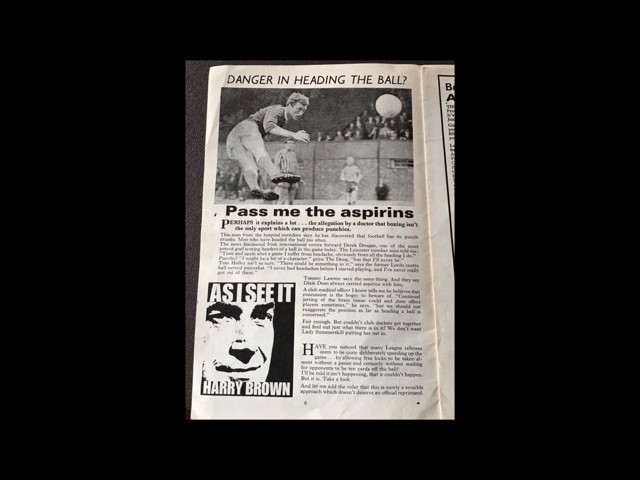Campaigner Dawn Astle has welcomed the opening of a parliamentary inquiry into the link between playing sport and long-term brain injury, saying the issue has been “swept under the carpet” for too long.
The death of Astle’s father Jeff in 2002 was determined by a coroner to be the result of a neurodegenerative condition caused by repeated heading of a ball during his professional football career.
MPs on the Digital, Culture, Media and Sport (DCMS) committee will hear evidence from a range of individuals with a connection to the issue over the coming weeks, and Astle said it had been “a long time coming”.
“I just hope really that (the MPs) leave no stone unturned,” she told the PA news agency.
“For millions of people around the world, we’re huge fans of the game. But for the player, it is just their job, and they should be afforded the same protection from known risks as anybody else in any other job.
“Just because they’re sportsmen shouldn’t mean it doesn’t matter, because it’s part of the game. That’s not acceptable when players are dying.”
The 2019 FIELD study, commissioned by the Football Association and the Professional Footballers’ Association, found professional footballers were three and a half times more likely to die of neurodegenerative disease than age-matched members of the general population.
Astle, who is currently supporting the PFA on an advisory basis, said that study would not have been conducted without the pressure her family placed on the authorities.
At the UofG press conference for the FIELD study results, published today @NEJM, @UofGMVLS’s @WillStewNeuro says ‘This is the largest study to date looking at the incidence of neurodegenerative disease in any sport not just former professional footballers’ #WorldChangingGlasgow pic.twitter.com/HzmlxDjDIi — University of Glasgow (@UofGlasgow) October 21, 2019
“This issue has been swept under the carpet for far too long,” she said.
“The FIELD study wasn’t done out of the goodness of the heart of the FA or the PFA, that study was done because my family wouldn’t let them sweep it under the carpet.
“It was my family who had the meeting with (former FA chairman) Greg Dyke and said, ‘you need to be looking back – have we got a problem with our former players?’ And we clearly have.
“I suppose Greg wasn’t in charge of the FA when my dad died – (PFA chief executive) Gordon Taylor has been around forever.
“I want to know why they didn’t do enough.”
The dangers of heading were being talked about as far back as 1966 – in a pamphlet included within the Football League Review in 1966, which was included within match programmes.

Under the headline ‘Danger in Heading the Ball?’ the article began ‘Perhaps it explains a lot the allegation by a doctor that boxing isn’t the only sport that can produce ‘punchies’.
‘This man from the hospital corridors says it’s been discovered that football has its ‘punchdrunks’ – men who have headed the ball far too often’.
Astle added: “It is time for the Government to get involved. I’ve asked the PFA and Gordon what they have done in the 19 years since my dad died, I’ve asked the FA the same question.
“It’s all right Greg Dyke apologising and saying ‘we haven’t done enough’ – why didn’t you? It’s all right saying to Gordon, ‘what did you do? How many players were affected?’ He didn’t know. He still doesn’t know. Why doesn’t he? He should know.
“This isn’t a metatarsal injury or a broken leg, this is something that is killing former players at a hugely increased rate.”
The PFA said it is “committed to funding research, supporting former members and their families who are living with dementia, and identifying areas within the game to protect current players”.
A statement from the organisation continued: “The PFA Charity funded FIELD Study provided the first major insights into lifelong health outcomes in former professional footballers. Alongside the FA, the PFA has committed to funding further research to advance the FIELD study’s findings.
“Separately, the PFA Charity has extended the project with Glasgow University until 2022 and supports three other existing research projects. At the beginning of this year, Dawn Astle and Rachel Walden started advisory roles at the PFA to shape the long-term care support offered to members.
“The players’ union is also working towards stronger protections for current players, including lobbying IFAB for the introduction of temporary concussion substitutions, reduced heading frequency in training and rest periods in between heading sessions.”
The FA added: “We have a clear and unwavering commitment, both financially and with resource, to support objective, robust and thorough research going forward.”
Dr Willie Stewart, consultant neuropathologist and honorary professor at the University of Glasgow, said: “This investigation… is timely and welcomed.

“Best evidence supports the association between elite-level contact sports and increased risk of dementia and similar conditions. The challenge now is to reduce this risk… while also working with former athletes to improve their brain health once they have left the game.”
England manager Gareth Southgate is involved in one such project – the HEADING study which is being conducted by the London School of Hygiene and Tropical Medicine and is supported by the FA.
Legal actions are set to be brought forward by the families of former footballers suffering with dementia in the coming months, while a letter of claim on behalf of a group of rugby union players has already been lodged with World Rugby, the Rugby Football Union and the Welsh Rugby Union.
Progressive Rugby, a lobby group calling for the urgent reform of the sport and which includes former England international James Haskell, said it welcomed the new inquiry.
The first evidence session is due to take place next Tuesday. The Alzheimer’s Society has already confirmed that its head of research, Dr Richard Oakley, had been called as a witness, as has the chief executive of brain injury charity Headway, Peter McCabe.






